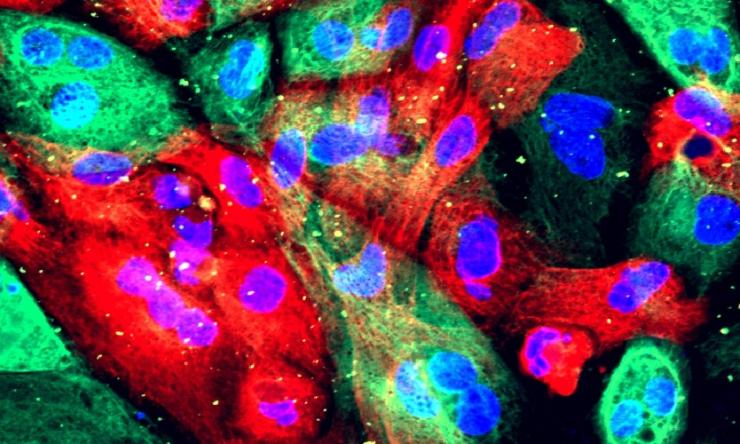Genomic alterations in advanced cancers reveal interactions with therapy
A novel way to look at cancer treatment resistance offers the possibility for identifying genetic mechanisms involved and alternative treatment approaches. A study led by researchers at Baylor College of Medicine and published in the journal Cell Reports, can help scientists make reasonable predictions of what genomic changes may happen in advanced cancer depending on the therapy received, how these changes may affect cancer progression and the possibility of preventing or minimizing outcomes with treatments.
“Treatment resistance is a big problem in cancer as it leads to the worst outcomes,” said corresponding author Dr. Chad Creighton, professor of medicine and co-director of Cancer Bioinformatics at the Dan L Duncan Comprehensive Cancer Center at Baylor. “Often, we don’t know what made the tumor resistant. Our approach is a way to answer that question, as it provides a strategy to identify the genes that might be involved and may suggest alternative therapeutic approaches.”
Usually, when investigating genetic changes to explain cancer, researchers look for mutations in the genes themselves. In this study, Creighton and his colleagues instead analyzed genomic structural variations, which refer to changes in the genome that alter the regulation of gene expression.
Genomic structural variations occur when a piece of DNA that is in one part of the genome is moved to another part of the genome, which disrupts the original genetic instructions encoded in DNA.
Disrupting DNA-encoded instructions can alter the expression of neighboring genes in ways that can lead to disease. For instance, certain genes called oncogenes, which promote cancer growth, are normally turned off. But if the genetic instructions are rearranged such that an ‘on switch’ is now positioned next to the gene, then the oncogene would be turned on and promote cancer growth.
In a previous study, Creighton and his colleagues had looked into genomic structural variation in primary tumors. The current study looked at 570 recurrent or metastatic tumors from the Personalized OncoGenomics (POG) Program at BC Cancer, known as the POG570 cohort.
The study analyzed different types of cancer, including bladder/kidney, breast, cervix/ovary, central nervous system, colorectal, head/neck, liver-biliary, lung, lymphoma, pancreas, prostate, sarcoma, secretory, skin, stomach/esophagus, uterus and others. These tumors had been profiled using Whole-Genome Sequencing, to look at the DNA sequences, and RNA sequencing, to measure gene expression, and represent mostly samples collected after patient treatment.
“The initial study with the POG570 data had focused mainly on point mutations and small mutations,” Creighton said. “For the current study, we initiated a collaboration with Dr. Marco Marra’s group in Canada’s Michael Smith Genome Sciences Centre at BC Cancer, which had developed the POG570 datasets, to study the impact of genomic structural variations on gene regulation in advanced cancer.”
The POG570 data not only included genomic data from advanced cancers but also information on the treatment many of the patients had received.
“This was a really good opportunity to look at what genes in advanced cancer have altered expression due to structural variation, but also what gene alterations could be associated with therapy,” Creighton said.
Taking together all the cancer types analyzed, the team identified more than 300 top genes with altered expression. “Not all of these genes would have the same relevance in the disease,” Creighton explained. “The idea is that sifting through these data can help prioritize genes that seem to have a higher effect on cancer than others, and those that are more relevant might become targets of therapies for advanced/metastatic cancers.”
The team also looked at the overall extent of genomic structural variations in these cancers in relation to therapies. They wanted to better understand therapy resistance; how the tumor’s response to treatment may help the cancer survive.
For instance, the researchers found that patients treated with therapies that would target DNA damage or cell division tended to have higher numbers of genomic rearrangements on average, which were associated with altered expression of metabolism-associated genes.
“Our findings can help identify potential mechanisms of cancer resistance to therapy in terms of the genes that might be involved. These genes can represent potential new therapeutic targets in the advanced cancer setting,” Creighton said. “In addition, the findings can offer suggestions for combinations of current therapies that have not been previously considered.”
“Cancer cells accumulate mistakes in the genome. Similar to a book with missing or shuffled pages that alter the underlying story, rearrangements of the genomic sequence can impact how the genome is read,” said co-author, Dr. Laura Williamson, clinical informatics team lead at Canada's Michael Smith Genome Sciences Centre. “To date, most tumor profiling studies only have sequenced a small proportion of the genome, often 1% or less. Here we sequenced the whole genome. What excites me the most about this paper is that it demonstrates that whole genome sequencing offers the opportunity to explore how the non-coding parts of the genome can lead to cancer, and particularly treatment resistance.”
Other contributors to this work include Yiqun Zhang, Fengju Chen, Erin Pleasance, Laura Williamson, Cameron J. Grisdale, Emma Titmuss, Janessa Laskin, Steven J.M. Jones, Isidro Cortes-Ciriano. The authors are affiliated with one or more of the following institutions: Baylor College of Medicine, Canada’s Michael Smith Genome Sciences Centre at BC Cancer, University of British Columbia, Simon Fraser University and the European Bioinformatics Institute.
This study was supported in part by National Institutes of Health grant P30CA125123 and the European Molecular Biology Laboratory.







 Credit
Credit



